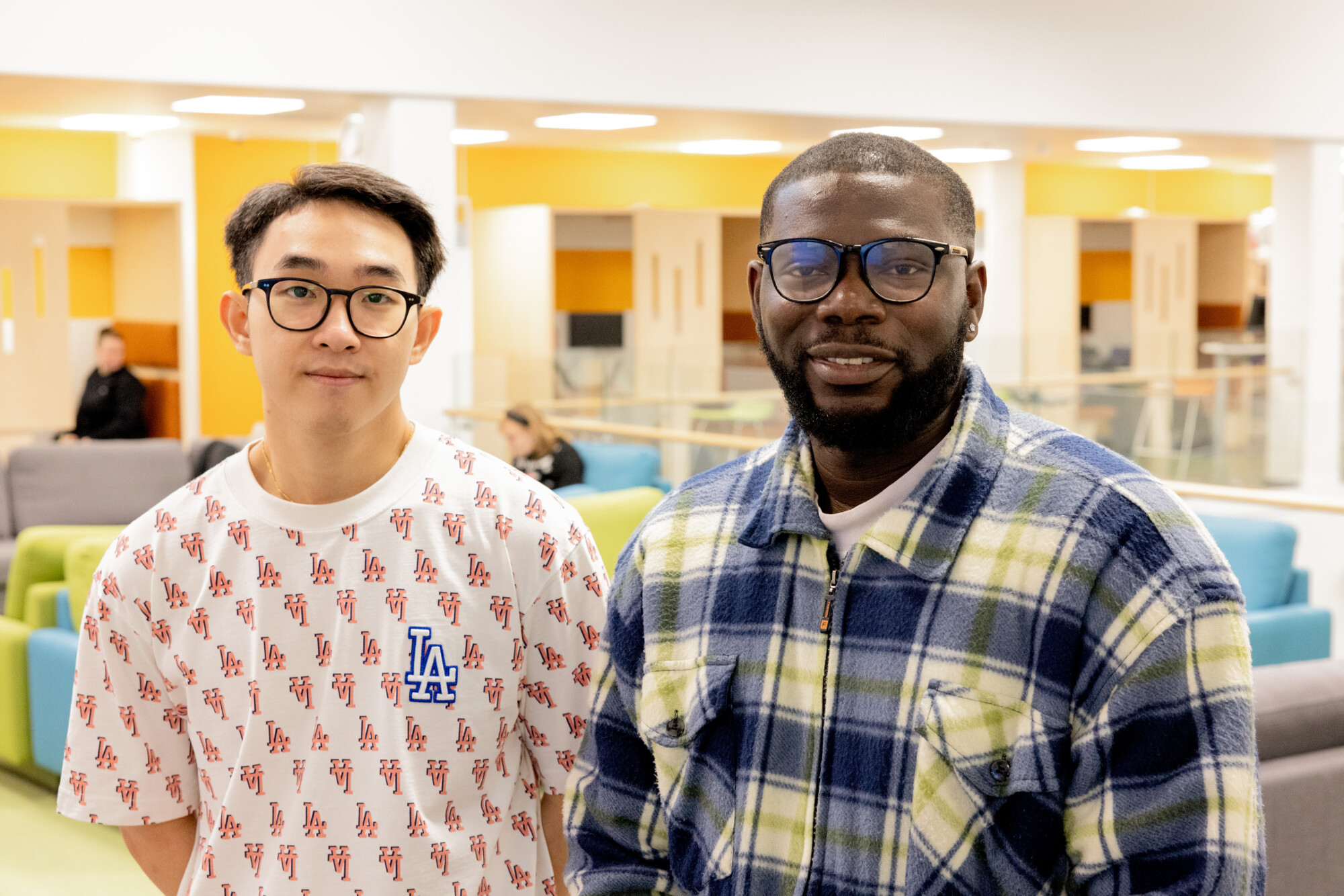
Addressing the ICT talent shortage in Eastern Finland – Unlocking the potential of international students
ICT expertise is needed across various industries in Eastern Finland, but a shortage of skilled professionals hinders the field’s growth. International students in the region are an important resource, yet they face challenges such as finding internships and improving their Finnish language skills. Two of Savonia’s IT students talked to us about how they could benefit society with their knowledge and work experience.
When Nhan Vo from Vietnam and Oluwatobi Ikuesan from Nigeria arrived in Kuopio, their paths to Savonia were marked by curiosity, challenges, and a drive to explore the future of technology. Both students have settled in Kuopio and are progressing well in the Information Technology – Internet of Things (IoT) degree programme.
The students are fascinated by IoT, which blends cutting-edge technology with real-world applications. Nhan, in his third year, wants to broaden his understanding of future technologies.
“The studies have been interesting, and the experience has been good so far”, he remarks.
For first-year student Oluwatobi, the decision was driven by Europe’s rapid advancements in IoT.
“I want to understand the field and contribute to its growth”, he says.
A welcoming community with room to grow
Kuopio has offered both students a warm reception, though their experiences reveal room for growth in fostering inclusivity.
“The teachers are approachable, and there’s no gap between students and lecturers”, Nhan says, appreciating the Finnish education style.
However, he notes that some courses could improve in quality due to language barriers. Oluwatobi echoes the sentiment of feeling welcome.
“People are generally helpful and curious about strangers”, he observes.
Nhan and Oluwatobi highlight areas where Kuopio and Savonia can better support international students. Oluwatobi suggests creating more opportunities for cultural mingling and offering practical internships in local businesses.
“Even finding a cleaning job can be challenging.”
Nhan emphasises the need for local companies to recognise the value of international talent.
“If this area wants to go global, international students bring an open mindset and fresh ideas.”
Both believe fostering dialogue between students and administrative leaders can lead to meaningful change.
Building on prior experience for future success
Both students bring valuable work experience to their studies. Oluwatobi’s background as a graphic designer in Nigeria aids his understanding of assignments and his ability to assist peers. Nhan’s work in his cousin’s business back in Vietnam has equipped him with foundational IT skills, making many tasks in his coursework manageable.
Their prior experience enhances their learning and positions them as assets in their current and future workplaces. Nhan already works remotely for a software company in Espoo, applying his knowledge in real time. In the future, he hopes to work in research and development.
“I enjoy roles that involve communication, not just staring at a laptop for eight hours a day,” he explains.
Oluwatobi envisions contributing to IT-related projects in smart cities or healthcare, with a long-term goal of becoming a software engineer. He also aims to integrate into Finnish culture by learning the language.
Information-based support for international students and local businesses
Northern Savo and North Karelia regions face a shortage of ICT professionals, which slows development in both industrial sectors and service businesses. Both regions host many international ICT students, representing a potential talent pool for the area.
The Talent Hub Eastern Finland project supports international students by gathering information about their backgrounds and offering employment-enhancing measures. Provided information also benefits local businesses as they will be better aware of future workforce skills.
By the end of October 2024, approximately 480 international students had responded to the student survey, of whom 100 were IT students from Savonia and the University of Eastern Finland. The students come mainly from Asia and Africa. 63 % have completed a bachelor’s degree, and 36 % have over five years of work experience. Still, Finnish work experience is limited, as only 25 % have more than one year of experience. While most students have advanced English proficiency, Finnish language skills need improvement – only 14 % have intermediate-level Finnish skills.
In addition to Savonia’s Information Technology – Internet of Things degree programme and UEF’s bachelor’s degree programme in Information Technology, IT professionals can be found in several other programmes based on the students’ previous degrees and work experiences. At Savonia, such degree programmes include Mechanical Engineering, International Business and Energy Engineering. At UEF, IT experts are educated in the Digital Marketing and Analytics master’s programme and the doctoral programme in Science, Forestry and Technology.
Talent Hub Eastern Finland is a cooperation of UEF, Karelia, Savonia, Riveria, Sakky and YSAO. We aim to ensure that international students who come to our region find their place, secure employment, and integrate into Eastern Finland. We will help students get to know Finnish working life, build networks, learn the language, and find internships, jobs and business opportunities. For employers, we offer support and concrete tools for recruiting, onboarding, and learning Finnish at the workplace as well as adapting to the Finnish work culture. The project is co-funded by the European Union. Learn more on our website.


